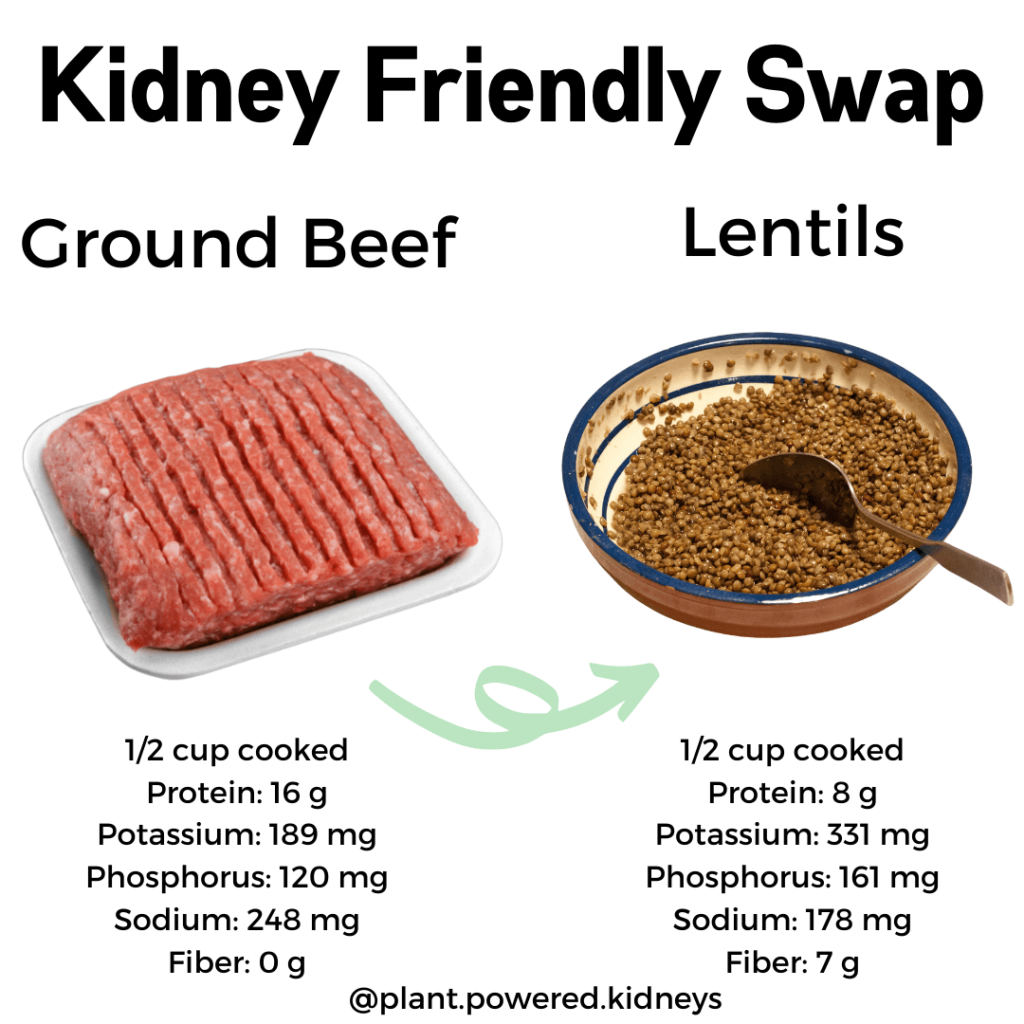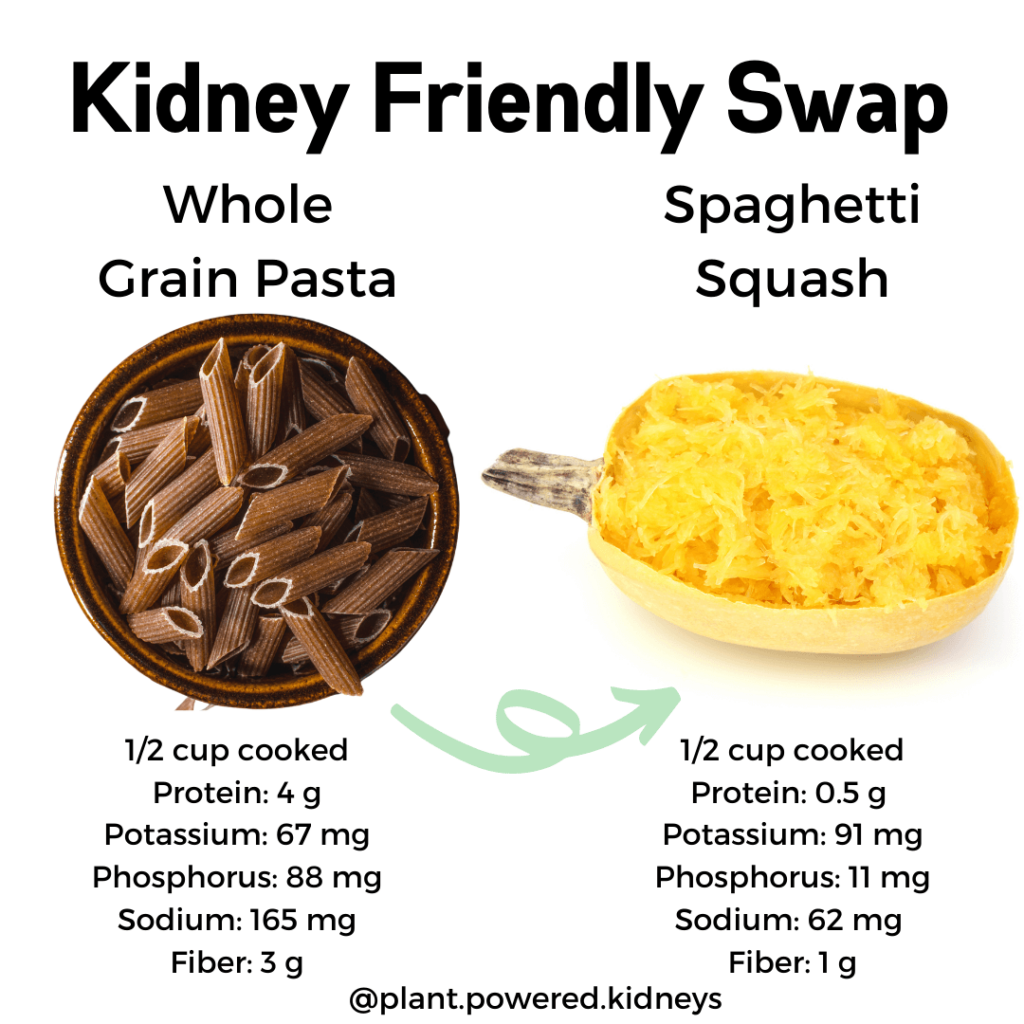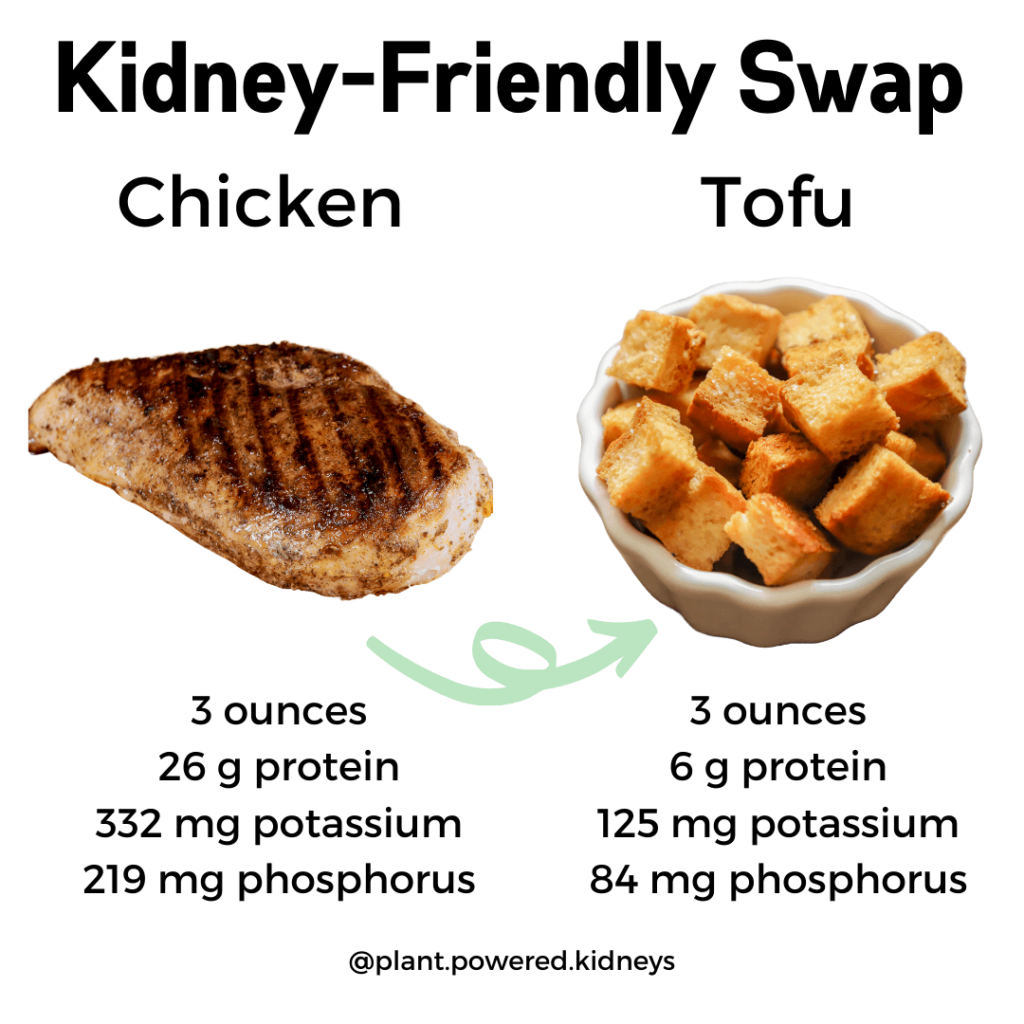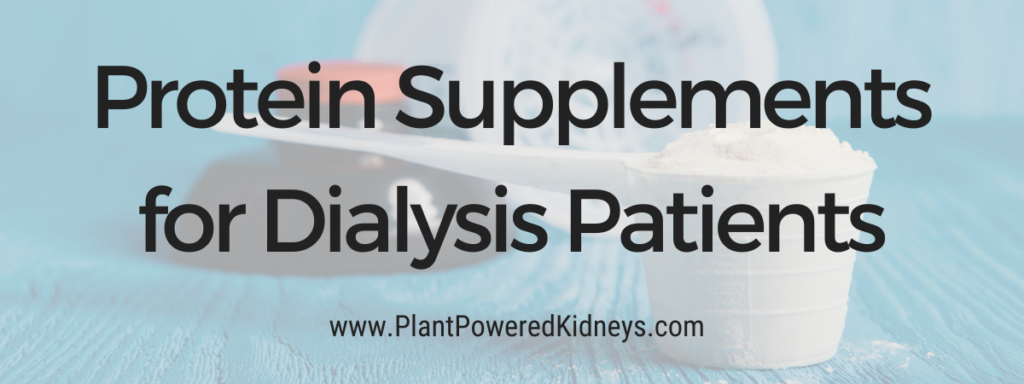When it comes to taking care of kidney disease and preventing further kidney damage, the very first thing you should look into is the low protein diet. Why? Because protein can be very damaging to your kidneys.
What exactly is a low protein diet? How do we define it? Who should be following this? What risks are involved? And how do I know that I’m doing it right? Let’s dive into these questions and more!
This page contains affiliate links for resources that I believe in. If you make a purchase through this page, I may receive a small compensation at no cost to you. I only provide links to resources that I have found truly valuable. Thank you for your support of our website and business!
Table of Contents
What is a low protein diet?
A low protein diet is a diet in which the daily protein allowance is restricted below the general nutrition guidelines.
The general recommendation for adequate protein is 0.8 grams of protein per kilogram of body weight.
A low protein diet is anywhere from 0.6 to 0.8 grams of protein per kilogram of body weight. The specific amount determined in this range will include factors such as age, activity level, stage, and cause of kidney disease.
Fat and carbohydrates will need to be adjusted when on a low protein diet. Fat and carbohydrates are the other to macronutrients in our diet. (Although technically, alcohol is considered another.)
And while I’m not a fan of the traditional ketogenic diet, I do believe that a modified version can be very beneficial. Read more about the keto diet and kidney disease here.
What are the health benefits?
A low protein diet can provide several proven benefits for those with kidney disease.
Research has shown that a low protein diet can reduce protein in the urine, improved cholesterol and lipid levels, and even better glucose control for those with diabetes and early-stage CKD.
For many people with kidney disease, urea is a big issue. With a low protein diet, the amount of urea produced from protein metabolism is reduced. This can then lower blood urea nitrogen (BUN) levels to help keep kidneys safe.
Additionally, a low protein diet when paired with a low sodium diet has been shown to improve blood pressure.
Other benefits include;
- Keep kidney function longer
- Less protein in the urine
- Lower risk of metabolic acidosis
- Less oxidative stress
- Less insulin resistance
- Lower/controlled blood pressure
- Less uremic toxins
- Better control of phosphorus
Are there risks with a low protein diet?
If a low protein diet is not monitored by healthcare professionals, there can be potential side effects.
When reducing the amount of protein, there is a risk of not getting enough calories. This can lead to unintentional weight loss. When weight loss happens too quickly or in an unsafe manner, it can lead to muscle breakdown.
Another risk is increased inflammation. This can be caused by not eating enough calories or if the muscle breaks down. This inflammation can also cause poor blood sugar control.
A low protein diet generally requires avoidance or severe restriction of animal meats (more on that below). Because of this, a low protein diet may lead to anemia, one of the first signs and symptoms of kidney disease.
Read more about tips for anemia with kidney disease here.
Who should follow a low protein diet?
While this type of diet may be helpful for chronic kidney disease, it doesn’t mean this is something everyone should try.
Studies have found a low (or even very-low) protein diet to be beneficial for those in later stages of kidney disease, like stages 4 and 5. Read our comprehensive guide for stage 4 CKD here.
Research has also shown that those with diabetes and early stages of kidney disease may benefit from a low protein diet. However, the KDIGO guidelines state that those with diabetes be cautious with a low protein diet.
If you have both diabetes and kidney disease, it is important to work with a dietitian to have individualized guidance on the best amount of protein for your body.
Who should not follow a low protein diet?
Those with kidney failure on dialysis should not follow a low protein diet. The dialysis process includes filtration of the blood, which removes some protein. That protein needs to be replenished.
A dialysis diet requires approximately 1.2-1.4 grams per kilogram per day. But don’t worry, you can still follow a plant-based diet even on dialysis.
For those with cancer, a low protein diet is not recommended. However, this may be altered if there is also chronic kidney disease.
In these cases, it is especially important to work with a registered dietitian so that you get enough- but not too much- protein.
Foods to include on a low protein diet
A low protein diet will include a variety of foods. Food groups considered low in protein include;
- Fruits
- Vegetables
- Whole grains
- Healthy fats
Other components of a low protein diet include items such as;
- Herbs
- Spices
- Condiments like jam, mayonnaise, mustard, and ketchup
- Coffee and tea
- Sauces and some dips
While it’s not a guarantee, many with late-stage kidney disease may need to limit potassium. Obviously, this will be something to pay attention to when it comes to increasing your fruits and vegetables.
Remember- there are plenty of low-potassium fruits and vegetables available for you to enjoy. You can also likely still include some high potassium foods as well, but it’s best to work with a dietitian to know how to do that safely.
You can learn more about a low potassium diet here.
Heart-healthy fats are a must when it comes to a low protein diet. Some of my favorite fat sources include;
- Olive oil
- Avocado oil
- Sesame oil
- Flaxseed oil
- Walnuts
- Pecans
- Macadamia nuts
- Avocado
- Hemp hearts
- Low sodium olives
Foods to avoid on a low protein diet
Foods highest in protein tend to come from animal meats. So when we talk about a plant-based diet for kidney disease, this really fits the bill!
By cutting out animal proteins, you are going to eliminate some of the highest protein sources in your diet.
This includes;
- Chicken/poultry
- Fish/shellfish
- Beef
- Lamb
- Game meats
- Milk/dairy
- Eggs
Additionally, high-protein plant foods such as tofu, legumes and beans may need to be limited as well. It’s not just about the source of protein in your diet; it’s the quantity.
By cutting out these significantly high protein sources in the diet, you are giving your kidneys a break from dealing with a huge incoming protein load!
Protein Content of High Protein Foods
Here are two tables that outline the standard protein amounts for some foods that are high in protein. Tables are separated into animal-based foods and plant-based food categories.
High Protein Animal Products
| Food | Protein in grams, per 100 gram prepared serving, (unless otherwise noted) |
|---|---|
| Eggs | 12.4 |
| Egg whites | 10.7 |
| Cow’s Milk (2%) | 8.0 (in 8 ounces) |
| Cottage Cheese | 11.0 |
| Greek Yogurt | 10.3 |
| Cheddar Cheese | 23.3 |
| T-bone Beef Steak | 27.3 |
| Lamb | 27.6 |
| Pork Loin | 25.6 |
| Chicken Breast | 32.1 |
| Turkey Breast | 30.1 |
| Salmon | 24.6 |
| Tuna (canned) | 19.0 |
| Shrimp | 24.0 |
High Protein Plant Sources
| Food | Grams of protein per 100 gram prepared serving (unless otherwise noted) |
|---|---|
| Soy Milk | 8.0 (in 8 ounces) |
| Black Beans | 8.9 |
| Pinto Beans | 9.0 |
| Lentils | 9.0 |
| Tofu | 10.9 |
| Edamame | 11.9 |
| Tempeh | 19.9 |
| Quinoa | 4.4 |
| Almonds | 20.4 |
| Pumpkin Seeds | 29.8 |
| Peanuts | 24.4 |
| Peanut Butter | 22.5 |
| Chia Seeds | 16.5 |
| Hemp Seeds | 31.6 |
Flax Seeds | 18.3 |
Supplements for a low protein diet
Some studies have shown that adding ketoanalogues (don’t get this confused with the ketogenic diet) to a low or very low protein diet may help in delaying dialysis.
Adding ketoanalogues can be a beneficial way to get enough protein without the uremic wastes that come from dietary protein.
Ketoanalogues are the amino acids of proteins but without the uremic toxins, the body and kidneys typically deal with. Learn more about ketoanalogues here.
One of the other supplements you may want to look into is a kidney-safe multivitamin. While food should always come first, many people with a restrictive diet can benefit from a multivitamin that can help cover nutritional deficiencies.
Some of the common multivitamins for kidney health include ProRenal and Renavite. Be sure to discuss any and all supplements prior to starting with your doctor and dietitian.
Low protein diet sample menu
Here is an example of a day of a low protein diet for kidney disease.
Breakfast: Cream of wheat with ground flax seeds, chia seeds, berries, and maple syrup
Snack: Apple and popcorn
Lunch: Veggie wrap with avocado, lettuce, sprouts, red onion, cucumber, carrots, and hummus and a side of chips and corn salsa
Snack: Fruit and veggie smoothie
Dinner: Grilled, marinated Portobello mushroom with sauteed green beans, rice, and a side salad with olive oil and balsamic vinegar
Snack: Frozen grapes
Tips for switching to a low protein diet
Chickpeas instead of chicken is a great budget-friendly swap! And honestly, you haven’t lived until you’ve tried “pulled pork” jack fruit.
Here are a few ideas to inspire you.

Try swapping out ground beef with lentils. You’ll cut the protein amount in half!

Whole wheat pasta is great, but don’t forget it has protein, too. Try using spaghetti squash to lower the protein content of your meal.

Did you know that chicken has 26 grams of protein for a 3-ounce portion? Your palm is about that size, maybe larger. Try out some tofu for a big protein-saving trick. (The key with tofu is to marinade it!)
How to track a low protein diet
Tracking your food can be a great way to give you insight into your nutrition guidelines. A dietitian can help you decode your diet and make sure you’re in the guidelines to keep your kidneys safe and healthy.
One of my favorite trackers is Cronometer. You can use the free tool, but I think the real info is in the paid version. It will tell you so much more and you can set goals when working with your dietitian.
When tracking, you’ll want to be as specific as possible. It can get very tedious, but when you use a system like Cronometer you can set up some of your most common meals and re-use them for quick entries.
Be sure to compare your food journal with your lab test results. The test results can show you more details about your progress.
When to get professional help
To find out if you should or should not be on a low protein diet, it’s important to have a comprehensive nutrition assessment with a renal dietitian.
It is highly recommended you work with a dietitian when restricting anything in your diet. Ask your doctor for a referral to a dietitian or find one through resources like the National Kidney Foundation – or me!
A low protein diet comes with risks, so trying it by yourself is not recommended. Work with your healthcare provider to get the support you need and lower the risks of not getting enough nutrition.
Always inform your nephrologist about your goals when it comes to your health. And always speak up for yourself and your health!
Summary
A low protein or very low protein diet can be a good way to save your kidney function and stay away from dialysis for as long as possible.
With less protein comes more fat in the diet. Make sure that it still comes from healthy sources and not processed foods.
To follow a low protein diet in the safest and most beneficial way possible, work with a dietitian. Find a dietitian that specializes in renal nutrition!



Thank you Jen…. valuable info as always!
Francie
hi how are you.. i have Systemic Lupus with nephritis.. i have always problemwhen come to eating foods becaise i dont knoaw what i will eat due to proteinuria.. i want to ask your help regarding my diet as per doctor’s advice low fat low protein low sugar low salt. can you help me and guide me on how and what to eat every day ty
I really want to be your client on one to one . How much the fee and how long the session ,please thank you very much
I provide results to my private client, whether it’s with their labs, food options, or lifestyle. For that, it’s not just one session. I work with clients in 3-6 month programs. I’m currently booked, but if you join my email list you will be notified when spots open up. 🙂
Jen
Does Medicare pay for renal nutritionist and medical food Do you have a code ? Medicare needs this to pay or look up benefits
They say I was covered for medical therapy nutrionist we have ordered Ketorena today
Medicare does cover 3 hours per calendar year to see a dietitian. You’ll want to get a referral from your doctor and make sure that the dietitian accepts Medicare insurance.
Hi Jen! I am new at this online help regarding my kidneys. First of all, thanks for being such a great source of information. I do not have a renal dietitian, or any dietitian. Can you recommend a, or perhaps several, renal dietitians who practice on Long Island New York?
Jeff Mannix
Hi Jeffrey! So happy to be a provider of info for you. I accept clients from NY, but you can also check for others on the National Kidney Foundation’s dietitian directory. Hope this helps!
Jen
Hi
U are a great
Rd!
I got to know u
From james
I would like
To book an
Appointment
Thanks
Can u email me
Or call me
[email protected]
845 641 [email protected]
Hi there! I’m booked at this time, but keep an eye on announcements for when appointments open up! In the meantime, you can look for additional dietitians that may be available at http://www.plantpoweredkidneys.com/renal-dietitian-near-me.
Pingback: Kidney Disease and Weight Loss - The Geriatric Dietitian
Hi Jen,
I have a question about plant protein powder for a shake. My doctor thinks I need to add more plant protein to my diet. My latest GFR was 51, up from 46. Is it okay to add a protein powder shake to my daily diet to insure I’m getting enough protein or is that harder on the kidneys? If it’s ok, what product do you recommend?
I have only recommended protein powder for people on dialysis, who lose protein in their treatment. Unfortunately, I’ve heard even from my private clients when doctors encourage more protein. This is not their place to make dietary suggestions. I would highly encourage you ask your doctor for a referral to a dietitian as that exact advice could potentially be damaging to your kidney health. If your doctor refuses, you can seek a dietitian out yourself. Here’s a link to some places you can look for a dietitian.
Hi Jen,
i have been lately diagonized with CKD stage-3 and have been following your podcasts over DadviceTV.
could you guide me with a Renal Dietician from INDIA, since i m from india.
Thanks a lot for your support.
Best,
Anirban
Hi Anirban! Thanks so much for reaching out. With the different country rules with dietitians, we are only able to work privately with those in the United States (yes- it sucks). BUT we are able to open our 6-week Plant-Powered Kidneys Course to those internationally, which is a great starting point to learn a lot of the fundamentals about the plant-based renal diet! We’ll be opening enrollment soon – you can get on the waitlist here so you get notified when we open in a few weeks. Otherwise, you can also check our renal dietitian directory for dietitian associations and contacts in different countries, including India. – Jen 🙂
Do you have an article on how to marinade and cook tofu and what to marinade with?
Hi John! We don’t at the moment but will keep it in mind for the future! It may help to check out our free Facebook group – there are a lot of resources about tofu in there! 🙂
I have recently been diagnosed with nephrotic syndrome from Minimal Change Disease. (Also following low FODMAP diet for IBS)and not finding much info about what to do in this situation. Would a lower protein diet be beneficial for me? about, say, .8kg/kg body weight? Thanks
We can’t comment here on individual recommendations. However, Minimal Change Disease can be associated with proteinuria. In cases where excess protein is leaking in the urine, a protein restriction may be helpful. It’s important to discuss any treatment plan, even limiting proteins, with your healthcare team to make sure it’s the right move for you.
Jen, I would like to be ur client. I need ur help can you schedule me. I tried to getvon ur wait list for ur 6 wk class. No respond, no message. How can I get pricing? I in Florida & really need ur help.
Hi Tee! Thanks for reaching out. I’m not currently taking clients. You can book a call with one of our dietitians or join the waitlist for our next course. If you’d like more support in these options, please contact us.
I took your course, and I am trying to follow your guidelines.
How can I find a dietitian to help me?
Hi Eleanor! If you’re in the US, you may be able to work with one of our dietitians! If not, or you’d like other resources, check out our other dietitian directories.